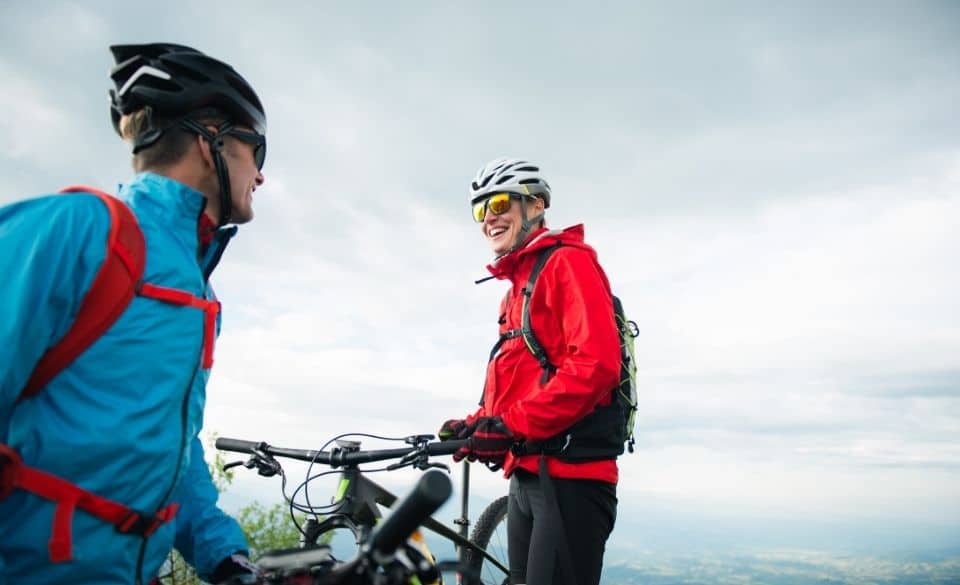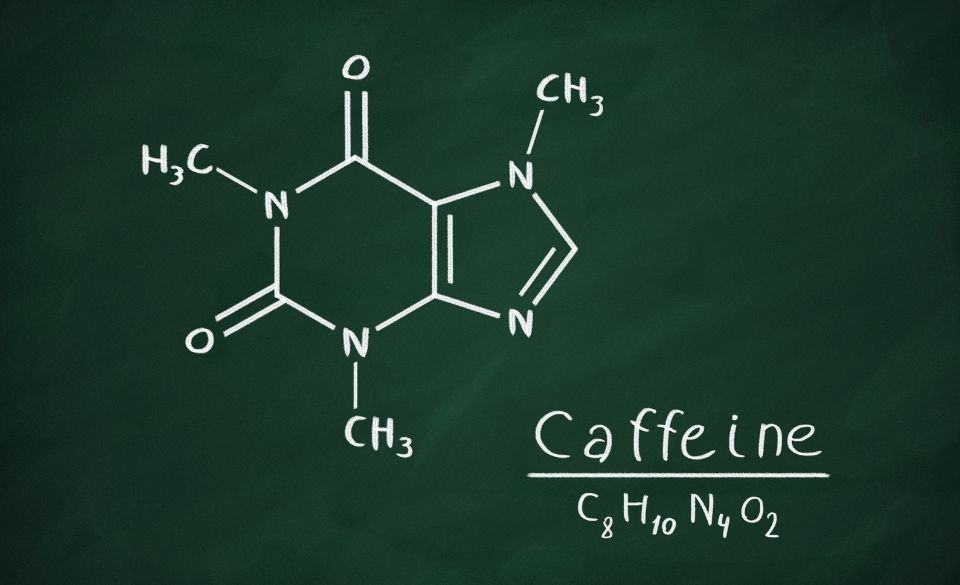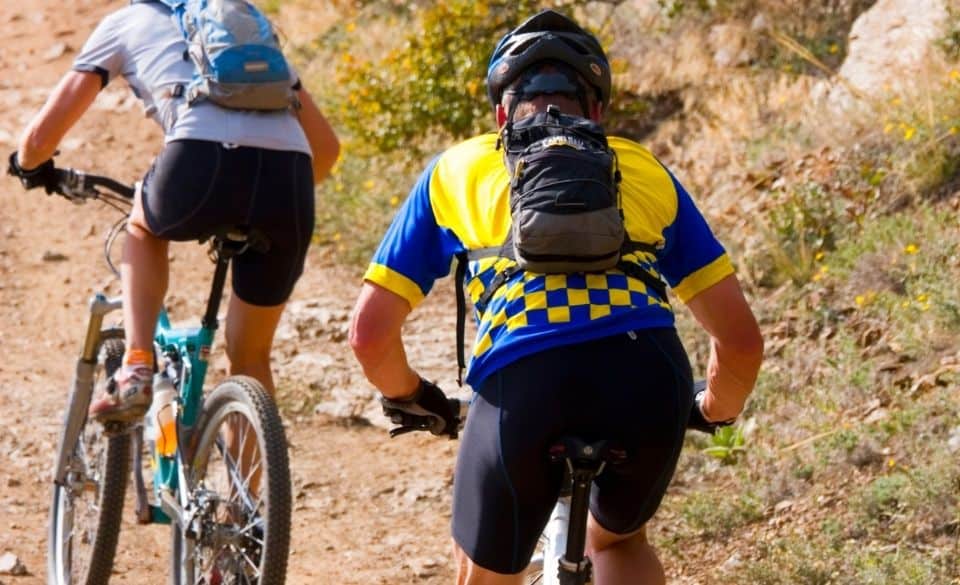
MTB Nutrition – UPDATED 2021 – Mountain Bike Nutrition Guide
Page Contents
Whether your burning calories flying down a technical trail or riding up a 15% gradient your MTB nutrition needs to be on point. The right nutrition strategy keeps our muscles fuelled during intense exercise and should never be forgotten. In this article we look at the basic strategy mountain bikers should focus on when it comes to nutrition.
MTB Nutrition – A Complete Guide
Mountain biking (MTB), even though divided into downhill, cross-country, slope style, Enduro, and four-cross events. Each discipline requires different physiological demands from the rider. Because of this, each athlete should be following a different approach to their MTB nutrition strategy.
Training load, body composition, and health play a role in determining the correct MTB nutrition strategy to implement. But there is one thing that they share in common. That is, the diet should contain a variety of nutrient-dense carbohydrates. Wholegrain bread, fruits, and vegetables with a regular serving of lean meat is vital to each of these athletes.
Carbohydrate intake should follow in line with the training load to help optimize the athlete’s performance and recovery. So frequent meals throughout the day can help fulfil energy needs and replenish glycogen stores.
A regular serving of lean meats, poultry, eggs, and dairy products will provide enough protein. The protein requirement will depend on the amount of mountain bike training and energy intake. Spreading of protein throughout the day in your MTB nutrition plan is more influential than the total daily amount.
For the cross-country rider that is aiming to reduce weight, limiting energy dense fluids such as alcohol and juices are a start. Then look at cutting back dense calories throughout the day when not riding. But make sure you only limited your calorie intake by no more than 200 calories a day under your estimated energy expenditure.
Additionally, timing your training to finish around mealtimes can prevent the need for additional snacking.

Mountain Bike Nutrition Guide
Following the right mountain bike nutrition guide is an important aspect of any high-level mountain biker. But what about us mere mortals? Nutrition and diet can have a big impact on your enjoyment of the rides and even so your recovery afterward. So it’s not just the professional athlete that can benefit from the right diet and nutrition strategy.
Since carbohydrate is our main source of fuel during mountain biking, fuel stores should be topped up 24-36 hours before a hard training day. Aim for around 45-65% of your calories coming from carbohydrates as a general guideline to follow.
Before training, it is also an important time to look at your energy intake. Food such as porridge and banana, rice, or a pasta dish can help top up glycogen stores (especially in the liver) before riding. These types of meals are relatively low in fiber and prevent any GI issues you may be prone to when riding.
Last but not least, hydration. Dehydration is a major cause of fatigue, concentration loss, and performance decline. Making sure you are well hydrated prior to riding is important. You can make sure you are fully hydrated by increasing intake leading up to your ride.
As a general rider, you should over complicate your MTB nutrition. Follow a well-rounded diet with an emphasis on carbohydrate intake and you should be able to hit the trails with loads more energy.
MTB Fitness Nutrition
Your MTB fitness nutrition plan should include a balanced intake of carbohydrates, protein, and fats. This may not be extremely important for the individual that rides 1-2 times a week. But for the rider hitting the trails daily, it can help improve recovery, performance and make riding a more enjoyable experience.
Carbohydrates should provide the highest amount of calories in your diet with a 45-65% intake. Followed by protein at 10-30% and lastly healthy fats, which should provide 10-30% of your daily calories.
The percentage of macronutrients will depend solely on the rider’s weight, fitness, age, and training load. So it is important to calculate your energy intake and work out the right amount for you.

Best Pre-Workout For Mountain Biking
They are many products on the market that claim to be the best pre-workout for mountain biking. But only one tends to shine above the rest, and that’s caffeine.
Caffeine is legal and widely used by many endurance athletes before training and racing. So as a strength and aerobic performance booster it is common that riders use caffeine to enhance their training.
Depending on whether you are a heavy user of caffeine, try to supplement 3-6 mg/kg into your pre-workout nutrition. This should be done 1-1.5 hours before you plan to ride, and the amount will depend on how much caffeine you consume daily. Riders with a high consumption will need to increase the amount to the upper ranges, and vice versa for the minimal users.
Other products such as BCAA’s, electrolyte drinks, and Beta-Alanine can also offer small performance-enhancing benefits. But is recommended that you check all ingredients of any pre-workout nutrition you take via WADA if you are a competitive racer.

Best Snacks For Mountain Biking
Mountain biking requires concentration at all times, so the best snacks for mountain biking are often the ones that are easiest to unwrap. But these snacks should also provide enough fuel to keep us powering along the trails.
Energy gels are far the leader in this department, they are easy to open and digest while hitting the trails at speed. But what about those easy days on the trails?
Simple carbohydrates offer a much faster energy source than complex carbohydrates. So foods like white bread and jam, bananas, raisins, and muesli bars are all a good alternative to energy products. These foods are relatively easy to eat and offer a fast energy source. Saying that, if you wrap them in foil can be spread your snacks across the ride to be eaten every 20-30 minutes. This allows you to keep drip feeding energy back into the body, and get in close to 60 grams of carbohydrates per hour.


